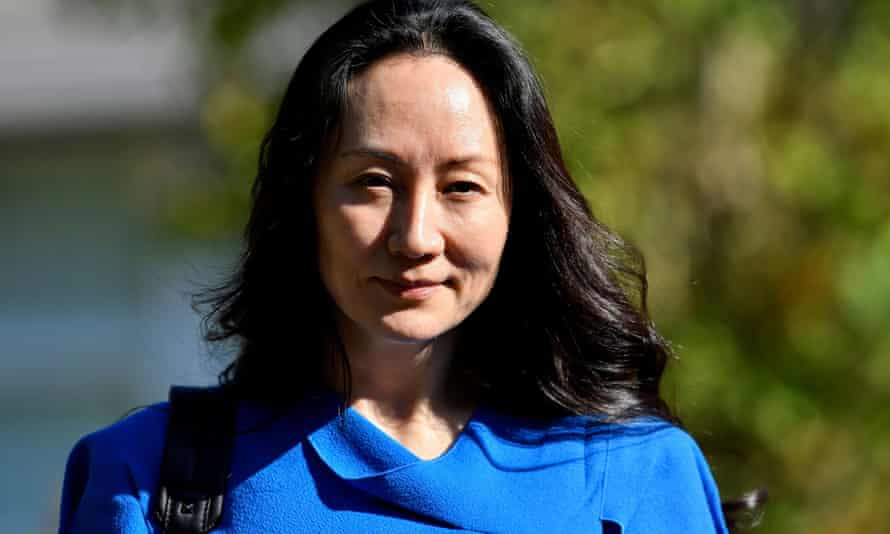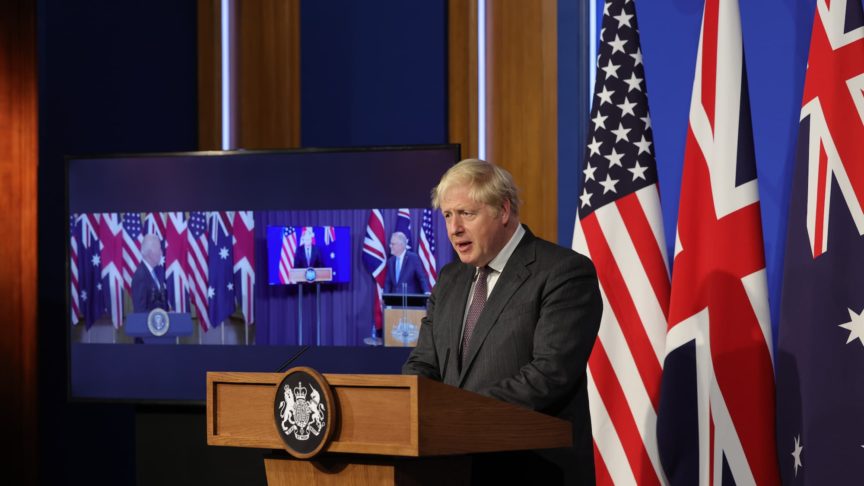The agreement with Wanzhou clears a topic of dispute between US and China and could bring release of two Canadians

Julian Borger in Washington and Vincent Ni
Fri 24 Sep 2021
A senior Chinese executive from Huawei, held in Canada since 2018 on US charges of bank and wire fraud, will be allowed to leave after a deal with prosecutors, removing a major irritant from US-China relations.
Meng Wanzhou, Huawei’s chief financial officer and daughter of the giant corporation’s founder, appeared virtually on Friday at a hearing in New York federal court from Vancouver where she was arrested in December 2018 on a US warrant. She has been under house arrest in the city since then, monitored by a private security company she pays for as part of her bail agreement.

Meng Wanzhou: ‘princess of Huawei’ who became the face of a high-stakes dispute
The Department of Justice sent a letter to the judge asking for a hearing “to address with this court a resolution of the charges against the defendant in this matter”.
The resolution of the Meng case raises hopes that China will free two Canadians, Michael Kovrig, a former diplomat, and Michael Spavor, a businessman, who were arrested days after Meng and charged, without evidence, of spying.
The arrests have significantly worsened Chinese-Canadian relations and have been one of many sources of friction in the US-China relationship. That has been made more fraught in the past few days by the formation of a new security agreement, Aukus, between Australia, the UK and the US, and a White House summit on Friday of the Quad group: the US, India, Japan and Australia.
Advertisement
The Biden administration has been insistent it is looking for areas where the US and China can work together.
Meng was indicted on bank and wire fraud charges for allegedly misleading HSBC bank on Huawei’s activities in Iran. Meng denied the charges and has been fighting extradition but as part of the plea deal unveiled on Friday, she admitted to some wrongdoing, and in return federal prosecutors agreed to defer and eventually drop the charges.
According to news reports by Reuters in 2012 and 2013, which were referred to in the US case against her, Meng and Huawei were linked to a scheme to sell computer equipment to Iran, in violation of sanctions.
“First, from the China side, China has put much pressure on the US side regarding Meng’s case. Since the beginning, China sees the Meng saga as a response to the US scheme to suppress China’s leading tech industry and regards Washington’s extradition request politically-motivated,” said Ma Ji, a senior lecturer at Peking University’s School of Transnational Law.
“And China had given Meng’s case particular weight. For instance, Beijing’s response to the Meng’s arrest in Canada – by taking two Canadian citizens in return – signals that one would play with the fire if they follow the US to undermine China’s core interests,” Ma said, adding that the US justice department may not have been sure of its evidence against Meng to be sufficiently confident in its case.
Karen Freifeld and Kenneth Li
Fri, September 24, 2021,

1/4
Huawei CFO strikes agreement with U.S. over fraud charges, allowing her to leave Canada
Huawei Technologies Chief Financial Officer Meng Wanzhou arrives to attend court in Vancouver

2/4
Huawei CFO strikes agreement with U.S. over fraud charges, allowing her to leave Canada
Huawei Technologies Chief Financial Officer Meng Wanzhou arrives to attend court in Vancouver

3/4
Huawei CFO strikes agreement with U.S. over fraud charges, allowing her to leave Canada
General view of the Brooklyn Federal Courthouse in New York City

4/4
Huawei CFO strikes agreement with U.S. over fraud charges, allowing her to leave Canada
Assistant United States Attorneys arrive for a hearing for Huawei CFO Meng Wanzhou CFO at the Brooklyn Federal District Courthouse in Brooklyn, New York
By Karen Freifeld and Kenneth Li
(Reuters) - Huawei Chief Financial Officer Meng Wanzhou has reached an agreement with U.S. prosecutors to end the bank fraud case against her, officials said on Friday, a move that should allow her to leave Canada and relieve a point of tension between China and the United States.
Meng was arrested at Vancouver International Airport in December 2018 on a U.S. warrant, and was indicted on bank and wire fraud charges for allegedly misleading HSBC in 2013 about the telecommunications equipment giant’s business dealings in Iran. The bank questioned her following stories by Reuters in 2012 and 2013 about those dealings.
Her arrest sparked a political storm between the two countries, and drew Canada into the fray when China arrested a Canadian businessman and a former diplomat shortly after Meng was taken into custody.
In an exclusive on Friday, Reuters reported that the United States had reached a deferred prosecution agreement with Meng. Nicole Boeckmann, the acting U.S. Attorney in Brooklyn, said that in entering into the agreement, "Meng has taken responsibility for her principal role in perpetrating a scheme to defraud a global financial institution.”
The agreement pertains only to Meng, and the U.S. Justice Department said it is preparing for trial against Huawei and looks forward to proving its case in court.
A spokeswoman for Huawei declined to comment.
At a hearing in Brooklyn federal court on Friday, which Meng attended virtually from Canada, Assistant U.S. Attorney David Kessler said the government will move to dismiss the charges against her if she complies with all of her obligations under the agreement, which ends in December 2022. He added that Meng will be released on a personal recognizance bond, and that the United States plans to withdraw its request to Canada for her extradition.
Meng - the daughter of Huawei founder, Ren Zhengfei - pleaded not guilty to the charges in the hearing. William Taylor III, an attorney representing Meng, said he was "very pleased" with the agreement, adding "we fully expect the indictment will be dismissed with prejudice after fourteen months. Now, she will be free to return home to be with her family."
Beyond solving a dispute between the United States and China, the agreement could also pave the way for the release of the two Canadians, businessman Michael Spavor and former diplomat Michael Kovrig, who have been held in China. In August, a Chinese court sentenced Spavor to 11 years in prison for espionage.
Meng, who has also used the English first names "Cathy" and "Sabrina," is confined to Vancouver and monitored 24/7 by private security that she pays for as part of her bail agreement.
"HUAWEI CONFIDENTIAL"
Articles published by Reuters in 2012 and 2013 about Huawei, Hong Kong-registered company Skycom and Meng figured prominently in the U.S. criminal case against her. Reuters reported that Skycom had offered to sell at least 1.3 million euros worth of embargoed Hewlett-Packard computer equipment to Iran's largest mobile-phone operator in 2010. At least 13 pages of the proposal were marked "Huawei confidential" and carried Huawei's logo.
Reuters also reported numerous financial and personnel links between Huawei and Skycom, including that Meng had served on Skycom’s board of directors between February 2008 and April 2009. The stories prompted HSBC to question Meng about Reuters findings.
Huawei was placed on a U.S. trade blacklist in 2019 that restricts sales to the company for activities contrary to U.S. national security and foreign policy interests. The restrictions have hobbled the company, which suffered its biggest ever revenue drop in the first half of 2021, after the U.S. supply restrictions drove it to sell a chunk of its once-dominant handset business and before new growth areas have matured.
The criminal case against Meng and Huawei is cited in the blacklisting. Huawei is charged with operating as a criminal enterprise, stealing trade secrets and defrauding financial institutions. It has pleaded not guilty.
Judicial hearings in her extradition case in Vancouver wrapped up in August, with the date for a ruling to be set on Oct. 21.
A Canadian government official said Ottawa would be making no comments until the U.S. court proceedings were over. Kovrig’s wife declined to comment. Representatives for Spavor could not be reached immediately for comment.
CHINA VS USA
Huawei has become a dirty word in Washington, with a knee-jerk reaction by China hawks in Congress to any news that could be construed as the United States as being soft despite Huawei's struggles under the trade restrictions.
Then-President Donald Trump politicized the case when he told Reuters soon after her 2018 arrest that he would intervene if it would serve national security or help secure a trade deal. Meng's lawyers have said she was a pawn in the political battle between the two super powers.
Senior U.S. officials have said that Meng's case was being handled solely by the Justice Department and the case had no bearing on the U.S. approach to ties with China.
During U.S. Deputy Secretary of State Wendy Sherman’s July trip to China, Chinese Vice Foreign Minister Xie Feng insisted that the United States drop its extradition case against Meng.
U.S. officials have acknowledged that Beijing had linked Meng's case to the case of the two detained Canadians, but insisted that Washington would not be draw into viewing them as bargaining chips.
(Reporting by Karen Freifeld, Kenneth Li, Jonathan Stempel, David Shpardson and Michael Martina; editing by Chris Sanders and Edward Tobin)














